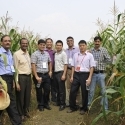Potassium management in rice–maize systems in South Asia
Evidence from long-term fertilizer experiments in rice–rice (R-R) or rice–wheat (R-W) systems strongly indicates significant yield responses to K application and negative K balances where K application is either omitted or applied suboptimally. South Asian farmers neglect K application to crops and remove crop residues from fields. These practices may strongly affect yield and soil K-fertility status in the emerging rice–maize (R-M) systems in different locations of South Asia. The current review assesses various K forms and K availability in diverse soil types of South Asia supporting rice-based systems. Aspects considered include: long-term crop yield and its response to added nutrients, K balance for intensive rice-based systems, and the role of crop residues in supplying K to crops. Emerging data from either completed or on-going experiments on the R-M systems in India and Bangladesh have revealed very high system productivity and variable responses and agronomic K-use efficiency of maize and rice. Potassium responses of maize are extremely high and variable for soils in Bangladesh. Finally, a plant-based strategy for field-specific nutrient management is presented and the need for models and decision support systems for developing efficient K management of the R-M system is also discussed.
Additional Resources
Potassium management in rice–maize systems in South Asia_2013.pdfSize: 0.13 MB

